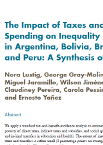CEQ Working Paper 13
Latin America has the highest degree of inequality (Ferreira and Ravallion, 2008). Poverty rates – although not the highest by far – are too high for its level of development (IDB, 2011, p. 43). Given these two facts, the extent to which governments use their power to tax and spend to attenuate inequality and poverty is of great importance. How much inequality and poverty reduction does Latin America accomplish through taxes and social spending? How progressive are revenue collection and social spending?
In order to answer these questions, the authors apply a standard tax-and-benefit-incidence analysis to estimate the impact on inequality and poverty of direct taxes, indirect taxes and subsidies, and social spending (cash and food transfers and in-kind transfers in education and health).
The extent of inequality reduction induced by direct taxes and transfers is rather small (2 percentage points on average), especially when compared with that found in Western Europe (15 percentage points on average).
What prevents Argentina, Bolivia, and Brazil from achieving similar reductions in inequality is not the lack of revenues but the fact that they spend less on cash transfers—especially transfers that are progressive in absolute terms—as a share of GDP.
Indirect taxes result in that net contributors to the fiscal system start at the fourth, third, and even second decile on average, depending on the country. When in-kind transfers in education and health are added, however, the bottom six deciles are net recipients.
The impact of transfers on inequality and poverty reduction could be higher if spending on direct cash transfers that are progressive in absolute terms were increased, leakages to the non-poor reduced, and coverage of the extreme poor by direct transfer programs expanded.
